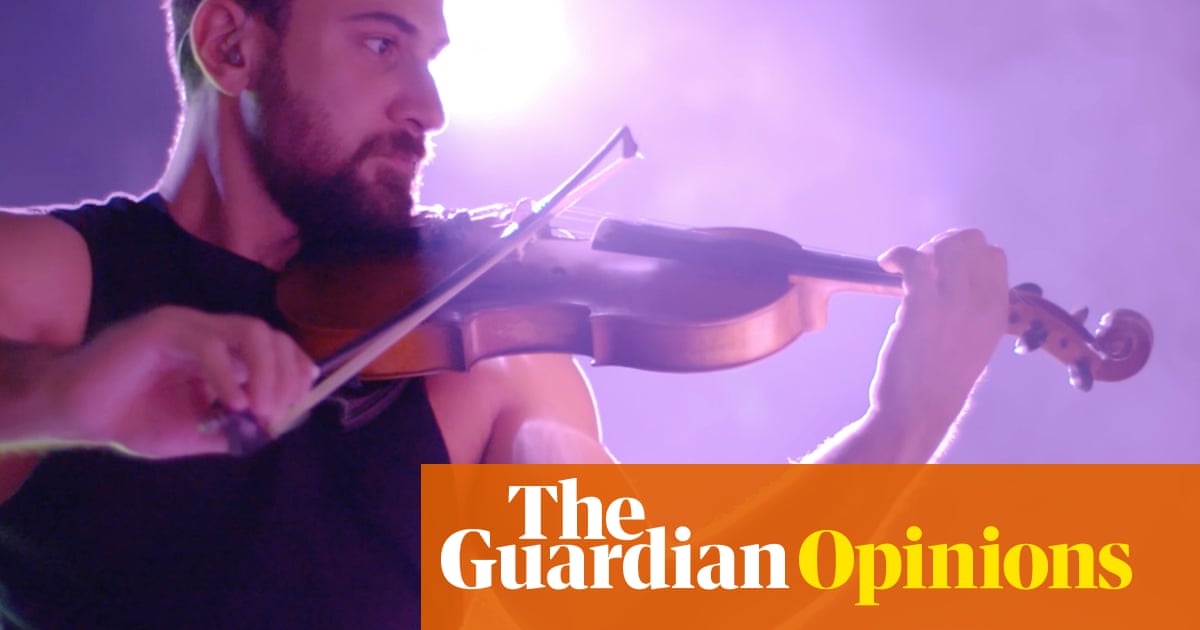
My band was silenced in the Middle East. But a global queer community gives me strength
In 2017, our band Mashrou’ Leila asked US students to imagine a fictional musical event that “saves” the world: The Great Gig in the Sky and it was up to them to decide what story they wanted to tell.
Since we formed 10 years before in Lebanon, our music appears to have created ongoing controversy as an indie rock band that has remained unwavering in support of queer rights, and criticism of Lebanese society and politics.
At that point, we were artists in residence at New York University’s Hagop Kevorkian Center, exploring how music can catalyse social and political change. The day before we arrived, we performed a gig in Cairo that ended up dramatically changing the band’s course. The day after, the Egyptian government cracked down on the LGBTQ+ community and arrested several of our fans after photos of them waving a rainbow flag were posted on social media platforms. We didn’t know then that it was to be our last gig in Egypt to date, and will further affect our ability to perform in other Arab countries. Our workshop at NYU turned into a vital platform to discuss what had happened, as it wasn’t being covered anywhere in the US media. And our touring continued in North America, which kept us under the illusion that things would eventually work out.
But when we returned to Beirut later in 2018 to write our fifth album, the joy had turned into despair. The home we created went from being a place of magic to one of persecution. We were completely burned out. Growing up in Beirut, the pain and traumas we share haunt us. From past wars, occupations, to more recent catastrophes; economic collapse, currency devaluation. We are stuck in an emotional rewind, unable to move forward, one crisis after another, with no time to grieve. I knew there was no future for me in this city.
By the end of the year I moved to New York more permanently, and for a short period of time, I had convinced myself that anything was possible. I continued touring with Mashrou’ Leila but in 2019, the series of events in Lebanon that targeted the band, and the economic and political crises, changed everything. Months before the pandemic, I was already feeling the loneliness and isolation of someone who has been exiled, not only from my home but from my life. Financial hardships were exacerbated by the pandemic and also directly by the crises in Lebanon (economic collapse, banking corruption and currency devaluation). The constant waiting, on every aspect of life, was soul-crushing.
My thoughts often wandered to Sarah Hegazi, the Egyptian activist who had suffered tragic consequences after waving the rainbow flag at our Cairo gig and was later exiled to Canada. We want our queer stories to have a happy ending, but the reality is often much harsher. Queer people who seek refuge and safety in Europe and North America to escape violence and threats back home, now have to navigate a whole new set of injustices and discrimination. While all the while the traumas of our past return to haunt us. So we are left here, further isolated, far from home, without the unconditional love and support of our families and community. From our new safe houses, we watch our worlds and dreams burn to the ground.
In the early days of the pandemic in New York, I was trying to forget the past as a way to deal with my traumas, I almost forgot who I once was. I was alienated by the lack of empathy a lot of the people surrounding me had. There was constant noise in my dreams. Grief and anxiety had rendered words inadequate, and the whole world seemed to be falling apart, but through music and art I could create a home to seek refuge, mourn, reflect and find hope. I picked up my violin for the first time in months and played music for the world outside my bedroom window, for my neighbours, friends, and strangers at the park.
One of the most vivid memories I recall from my childhood is listening to my mother singing an old folk song, Groong, about a migrating crane that can guide us home. In Armenian culture, andouni music is a form of lament for those in exile who long for a home. I shared a video recording from my bedroom performing Groong to friends and family back home in Beirut and Armenia. Like a crane, the video migrated elsewhere, multiplying as copies, screen recordings, edits, low resolution and audio-only versions, all shared through WhatsApp and social media. The recording managed to find its way back to me, with messages of gratitude from strangers all over the world. There was hope.

At times I close my eyes and am taken back to that Cairo gig in 2017. I can hear the crowd in my mind, and it’s euphoric. Thirty-five thousand voices singing our song Kalaam in unison. This is pride. A home of 35,000 bodies, voices, souls; our collective refusal to be shamed and silenced. We mourn together, we support one another, we celebrate each other.
In Armenian, the saying “tsavet danim” translates roughly as “let me carry the burden of your pain”. Learning from my Armenian community that has endured so many atrocities over the past century, I now understand that survival comes through a sense of community where everyone is ready to help alleviate each other’s pain, no matter what.
More than ever, our queer voices and regional public representation are so important as we seek compassion and courage to tell our stories, and unite us in our dangerous, often lethal, fight to be ourselves. We reap strength and freedom from our communities, friendships, and relationships. Our home, our pride, we’ll build it together. Now let’s make some noise.














